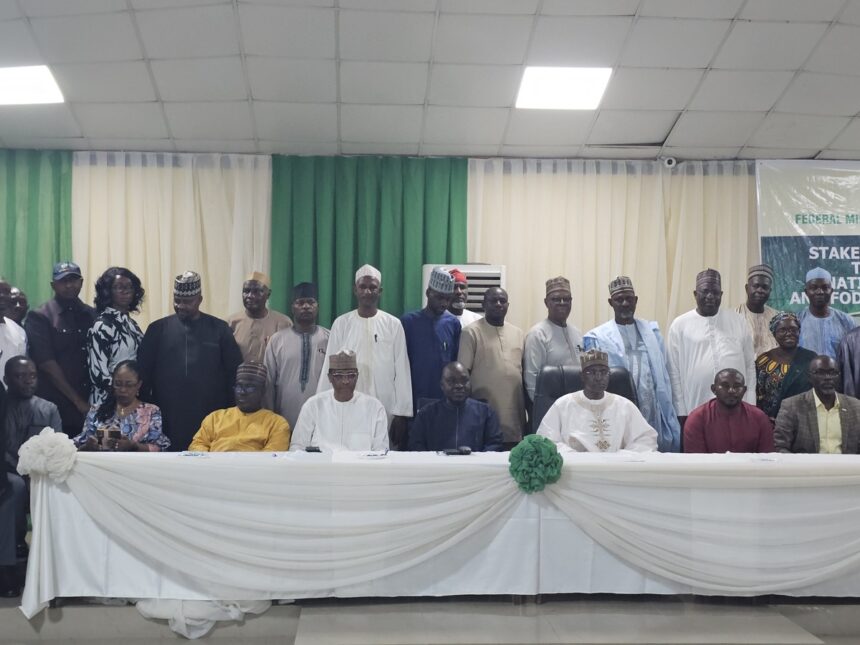The Federal Ministry of Livestock Development on Tuesday hosted a landmark validation workshop for the long-awaited National Animal Feeds and Fodder Policy at the ARMTI Guest House in Gudu, Abuja.
The event drew stakeholders from across the livestock value chain, ushering in a united effort to revitalise a critical segment of Nigeria’s agricultural economy.
In his opening address, the Minister of Livestock Development, Idi Mukthar Maiha, emphasised the importance of the policy in addressing long-standing challenges that have hampered the growth of the livestock sector.
“Animal feeds and fodder are the lifeblood of any sustainable livestock production system,” the Minister declared, as he said, “this policy is a strategic and inclusive response to the sector’s pressing challenges.”
According to Maiha, Nigeria’s livestock industry has been burdened by poor quality control, weak regulatory structures, and insufficient private sector investment.
The new policy, he said, aims to bridge these gaps by providing a comprehensive framework that promotes feed production, processing, marketing, and utilisation.
The policy is also central to the ministry’s ambitious plan to double Nigeria’s national herd to 398.9 million heads and increase livestock’s contribution to GDP from $32 billion to $74 billion by 2035.
“Feed and fodder development is one of the main pillars of this drive,” the Minister said, urging stakeholders to contribute constructively to the policy’s finalisation.
Winnie Lai Solarin, Director of Ruminants and Monogastric Development at the ministry, highlighted the role feed and fodder play in both production costs and national security.
“Feed and fodder account for over 70% of production costs in animal agriculture. They are also a key factor in recurring farmer-herder conflicts,” she said.
ALSO READ: Kwara govt launches $57.2m livestock project for agricultural transformation
Solarin stressed the need for a guiding framework, pointing out that Nigeria has lacked a national feed and fodder policy until now.
She noted the policy’s comprehensive focus, from production and processing to utilisation and legal frameworks, including land tenure issues, training, and monitoring.
“One thing is to grow pasture, another is to utilise it efficiently. The document will also establish legal backing, access to land, and how we can track implementation progress,” she explained.
The Director revealed that work on the policy began as far back as 2018 and commended the wide stakeholder participation that has led to the final validation stage.
“We are finally here with a holistic document ready for appraisal and implementation,” she added.
Speaking on behalf of the private sector and stakeholder platforms, Professor Maikano Ari, President of the Nigeria Feed and Fodder Multi-Stakeholder Platform, stressed the importance of private investment.
“We cannot continue to depend on government to drive everything. This policy must encourage data-driven and privately funded sector interventions,” he said.
Professor Ari also identified the fodder sub-sector as a crucial area for national stability. “The Nigerian security crisis is deeply connected to fodder resource scarcity. Investing in grasslands and revitalising our grazing reserves is now a national imperative,” he argued.
He emphasised the country’s natural advantage in fodder production. “From the Sahel to the Savannah, Nigeria is endowed with diverse pastures and shrubs that can be developed into a national asset. We have more than enough—what we need is strategic utilisation.”
Professor Ari pointed out that some nations have already tapped into Nigeria’s fodder resources, turning them into strategic economic tools.
He noted the need for structured distribution systems that link areas of abundant fodder production with areas of high livestock demand.
He emphasised business-to-business (B2B) opportunities in the sector. “The fodder economy thrives on commercial relationships. With the right policy in place, we can create a self-sustaining market that benefits farmers, investors, and the nation,” he added.
ALSO READ FROM NIGERIAN TRIBUNE
WATCH TOP VIDEOS FROM NIGERIAN TRIBUNE TV
- Let’s Talk About SELF-AWARENESS
- Is Your Confidence Mistaken for Pride? Let’s talk about it
- Is Etiquette About Perfection…Or Just Not Being Rude?
- Top Psychologist Reveal 3 Signs You’re Struggling With Imposter Syndrome
- Do You Pick Up Work-Related Calls at Midnight or Never? Let’s Talk About Boundaries






